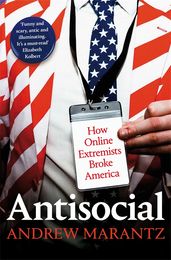Synopsis
‘An absorbing study of online propaganda and its threat to democracy’ – Guardian, Book of the Day
‘A wonderful record of these haywire times . . . it really explains how we ended up in this mess’ – Jon Ronson
This is a story about how the extreme became mainstream. It reveals how the truth became ‘fake news’, how fringe ideas spread, and how a candidate many dismissed as a joke was propelled to the presidency by the dark side of the internet.
For several years, Andrew Marantz, a New Yorker staff writer, has been embedded with alt-right propagandists, who have become experts at using social media to advance their corrosive agenda. He also spent time with the social-media entrepreneurs who made this possible, through their naive and reckless ambition, by disrupting all of the traditional information systems.
Join Marantz as some of the biggest brains in Silicon Valley teach him how to make content go viral; as he hangs out with the conspiracists, white supremacists and nihilist trolls using these ideas to make their memes, blogs and podcasts incredibly successful; and as he meets some of the people led down the rabbit hole of online radicalization.
Antisocial is about how the unthinkable becomes thinkable, and then becomes reality. By telling the story of the people who hijacked the American conversation, Antisocial will help you understand the world they have created, in which we all now live.
Details
Reviews
This is a wonderful record of these haywire times. Andrew Marantz is the perfect tour guide – dogged, self-reflective and a brilliant observer. Future historians will value this book. Because it really explains how we ended up in this mess.
Antisocial is at once funny and scary, antic and illuminating. It’s a must-read for anyone still struggling to understand the last election or hoping to make sense of the next one
Anyone who wants to know how Silicon Valley’s dream turned into democracy’s nightmare should read Antisocial, Andrew Marantz’s fascinating firsthand exploration of the trolls and nihilists who have hijacked the internet. This book puts contemporary politics in an alarming new light
Marantz has produced an essential work of reporting—one that illuminates not only how our information landscape emerged but also how it has become so corrupted and dangerous. If you want to comprehend the world in which we live, Antisocial is a book you must read
